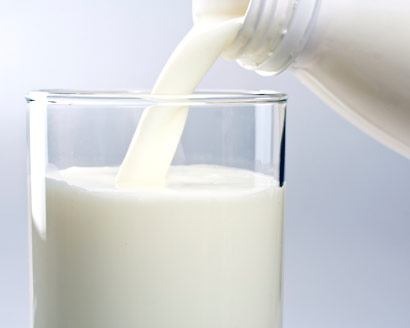6 Dairy Milk Alternatives
A cookie and a glass of milk used to be the perfect treat. That is, until nutritionists realized that sugar wasn't healthy and dairy probably wasn't nature's perfect drink. In light of recent debates over dairy, more people are choosing to abstain from milk products to ease a variety of illnesses. Milk can impact the body in myriad ways, affecting everything from acne and obesity to even sinus troubles. Alternative milks are no longer just the domain of the lactose-intolerant, vegans, and the dairy adverse; they fill grocery shelves, readily available to anyone eager to change their routine. In fact, non-dairy milk is one of the fastest-growing supermarket products, with almond milk leading the pack. Anne Marie Chaker from The Wall Street Journal wrote that "Almond milk's appearance in the refrigerated dairy case in 2010 helped fuel 13 percent growth in milk alternatives, a category where sales were flat the year before."
Click here to see the 6 Dairy Milk Alternatives Slideshow
Do these alternative milks pack a greater nutrition punch than the real deal? How do you choose which alternative milk fits into your diet the best? It can be tricky for someone new to this world to figure out what to drink.
There are a few guidelines to keep in mind when choosing your ideal milk alternative. Above all, everyone should be avoiding sweetened varieties. Rachel Begun, a registered dietician, warns against these sugary drinks, saying, "The sweetened varieties contain added sugars just like many other processed foods." Homemade milks are an easy way to ensure that you're getting proper nutrition without unwanted additives. Reading the nutrition label is also an essential when it comes to alternative milks; make sure you are getting enough vitamin D and calcium, two important nutrients that milk introduces to your diet. It's also important to try several alternatives, to make sure that allergens, such as soy or nuts, don't affect you.
Milk alternatives range from low-calorie to high-calorie. Some have more protein than milk, some less. Some are touted as thick, great for cooking or avoiding certain allergens. Most commercial alternative milks are fortified with vitamin D and calcium in order to give them a nutritional profile comparable to cow's milk, and most alternatives are low in fat, low in saturated fat, and free of cholesterol. Even if you don't need to wean yourself off milk, you may find that you prefer a milk alternative.
Still overwhelmed by the non-refrigerated packs of so-called milks? Never fear, here's The Daily Meal's guide to which milk to sip when you can't chug from the carton.
Note: All calorie counts were taken from one cup of the unsweetened original version if there is one, or the original version if there is no unsweetened option.
